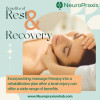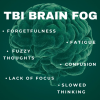Music does so many wonderful things for the body and the brain. It’s a cure-all that energizes, eases, distresses, and evokes positive emotions. Everyone has their own personalized connection to music.
The songs you love in good times and bad help create the most memorable moments of your life. You remember who you were dancing with when you first heard your favorite ballad or evoke strong emotions. You remember different songs you’ve shared with different people throughout your entire life. There is no doubt that music touches the human soul and changes us profoundly.
But did you know that music can also restore cognitive, sensory and motor function after traumatic brain injury?
Researchers have been trying to prove for decades what we have known since the dawn of time, music has the power to heal. There is evidence to support the use of music as a treatment for pain, memory loss, insomnia, and most recently traumatic brain injury.
Your Brain on Music
Music is processed in more than one part of the brain and there is literally a complex sound system in there. But the most interesting thing that science is helping us understand is these are the very same parts that deal with emotions. In other words, music is literally hard wired into our feelings.
The nerves deliver signals into the skull, then the brain starts lighting up.
Rhythm
The belt and parabelt on the right side of the brain are responsible for understanding rhythm.
Pitch and Tone
The recognition of tone and pitch are managed by the auditory cortex, which analyzes a song’s melody and harmony.
Anticipation
The prefrontal cortex is responsible for expectations because it’s pleasurable when songs surprise us with change.
Memory
Memory is stored in the hippocampus and it’s the reason you recognize your favorite song after hearing just the first few notes.
Performance
Going to see a concert might induce dancing and fire up the cerebellum, motor cortex, sensory cortex, and visual cortex.
Emotion
Three main areas of the brain responsible for emotions are the nucleus accumbens, amygdala, and the cerebellum. Because there is no doubt that music has the power to trigger intense feelings.
Music Therapy and Neuroscience
A Certified Music Therapist is someone who has a degree in music and can draw upon their extensive knowledge to help patients with their cognitive, sensory, and motor functions. Music Therapists try to understand the personal interest of the patient then customize the sessions towards their specific goals. These goals are focused on making the patient more independent and help develop strategies for deficits.
What does music therapy session involve?
If the goal is to regain movement, then the music therapist may use a variety of sounds to target specific movements. If the goal is to regain speech then the music therapist will use music with voice exercises to accomplish this.
Music therapists are trained to help patients achieve a wide variety of cognitive and physical goals.
The right therapy is a relative concept because it changes with to goals of each person. What is effective for one person might not be as effective for everyone, it depends on the patient’s goal.
Music Therapy Helps Brain Injury Recovery
How music therapy helps anxiety
Music alters our moods immensely. Imagine the difference between listening to fast-paced death metal music that makes you anxious versus listening to a soothing classical piano which relaxes you.
Anxiety is a prevalent problem with brain injury patients but studies suggest that listening to music releases endorphins, like dopamine, which creates that feeling of pleasure.
Brain Plasticity
A brain injury is different from any other injury because it changes your personality and mental functions. They also do not heal like other injuries but there is an achievable level of recovery because of brain plasticity. The brain is forced to develop new pathways or re-route information to compensate for damage.
Sensory stimulation can help in developing these new pathways and Music Therapy is an intense stimulation.
Harmonic and melodic information stimulates the brain and helps build structure, sensory processing, and strengthen the neural network to help recover from brain damage.
Clinicians are bridging the gaps with telehealth!
How music therapy helps anxiety
Music alters our moods immensely. Imagine the difference between listening to fast-paced death metal music that makes you anxious versus listening to a soothing classical piano which relaxes you.
Anxiety is a prevalent problem with brain injury patients but studies suggest that listening to music releases endorphins, like dopamine, which creates that feeling of pleasure.
Brain Plasticity
A brain injury is different from any other injury because it changes your personality and mental functions. They also do not heal like other injuries but there is an achievable level of recovery because of brain plasticity. The brain is forced to develop new pathways or re-route information to compensate for damage.
Sensory stimulation can help in developing these new pathways and Music Therapy is an intense stimulation.
Harmonic and melodic information stimulates the brain and helps build structure, sensory processing, and strengthen the neural network to help recover from brain damage.[/vc_column_text][/vc_column][/vc_row]



